At the Crossroads of Innovation: Embracing AI to Foster Deep Learning in the College Classroom
Educause
JULY 17, 2024
How can we, as educators, accept this change and use it to help our students learn? AI is here to stay.
This site uses cookies to improve your experience. To help us insure we adhere to various privacy regulations, please select your country/region of residence. If you do not select a country, we will assume you are from the United States. Select your Cookie Settings or view our Privacy Policy and Terms of Use.
Cookies and similar technologies are used on this website for proper function of the website, for tracking performance analytics and for marketing purposes. We and some of our third-party providers may use cookie data for various purposes. Please review the cookie settings below and choose your preference.
Used for the proper function of the website
Used for monitoring website traffic and interactions
Cookies and similar technologies are used on this website for proper function of the website, for tracking performance analytics and for marketing purposes. We and some of our third-party providers may use cookie data for various purposes. Please review the cookie settings below and choose your preference.

Educause
JULY 17, 2024
How can we, as educators, accept this change and use it to help our students learn? AI is here to stay.

Faculty Focus
MARCH 30, 2025
Artificial intelligence (AI) has transitioned from a speculative concept to a transformative tool in higher education, particularly within community colleges. Drawing on the scholarship of teaching and learning (SoTL), it argues that AI can enhance accessibility and efficiency while preserving the human essence of education.
This site is protected by reCAPTCHA and the Google Privacy Policy and Terms of Service apply.
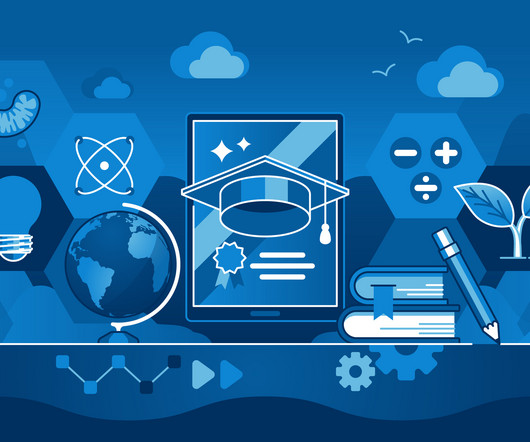
Faculty Focus
FEBRUARY 11, 2025
Banning AI use in college classrooms is a pointless and exhausting endeavor. Instead, we should learn alongside our students to become AI literate. It is imperative that all of us, students and faculty alike in higher ed institutions, learn AI basics and earn the right to use generative AI responsibly.

Liaison International
SEPTEMBER 26, 2024
The landscape of higher education is evolving rapidly, driven in large by part by the ability of artificial intelligence (AI) to reshape the way colleges and universities operate, from personalized learning experiences to enhancing administrative efficiency.
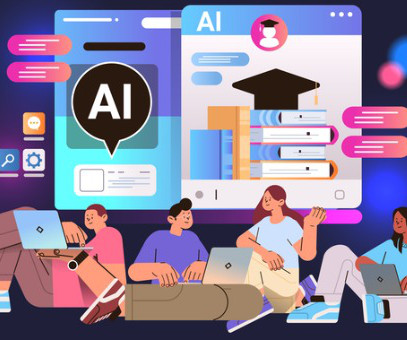
Faculty Focus
MAY 21, 2024
While being mindful of the concerns of plagiarism, equity, and access, some have argued educators must not only accept AI in the classroom but must help their students use it effectively as part of their digital literacy (Bender 2024, 9). As educators, we believe in the importance of fostering innovation and enhancing learning experiences.

Faculty Focus
MARCH 26, 2024
Generative Artificial Intelligence (AI) has become a significant conversation at every educational conference in the past two years throughout my usual treks to teacher education events. To the delight of some, and the horror of some, AI was at the forefront of educators’ minds in 2023.

University Business
FEBRUARY 11, 2025
Generative artificial intelligence (AI) is increasingly being integrated into higher education to address challenges such as personalized learning, operational efficiency, data-driven insights, research and innovation, and accessibility and inclusion. A complete AI governance program should also address faculty and staff usage of AI.
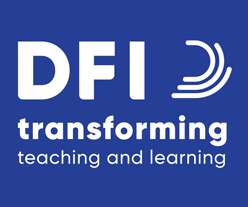
Deans for Impact
AUGUST 9, 2022
In this episode, you’ll hear from: Andrea Foster , Professor, College of Education, Sam Houston State University. Shannon Hammond , Assistant Professor of Special Education, College of Education, National Louis University. Leah Brown , Assistant Professor, School of Education, University of Alaska Fairbanks.

Faculty Focus
MARCH 30, 2025
Artificial intelligence (AI) has transitioned from a speculative concept to a transformative tool in higher education, particularly within community colleges. Drawing on the scholarship of teaching and learning (SoTL), it argues that AI can enhance accessibility and efficiency while preserving the human essence of education.
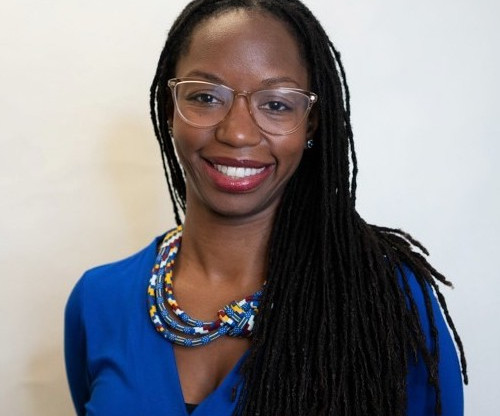
Diverse: Issues in Higher Education
OCTOBER 31, 2023
That’s because he studied abroad with our School for International Training program in Kenya as a college student over 30 years ago. Through a service-learning summer program in Ghana, I gained knowledge about West African history, culture and sustainable design. We need to provide the same vision that educators had in the past.
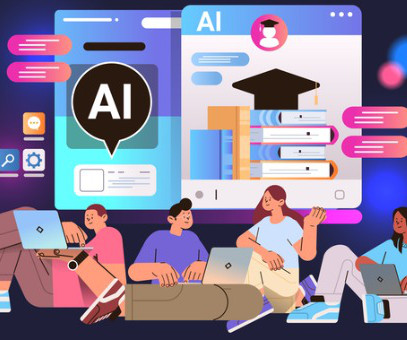
Faculty Focus
MAY 21, 2024
While being mindful of the concerns of plagiarism, equity, and access, some have argued educators must not only accept AI in the classroom but must help their students use it effectively as part of their digital literacy (Bender 2024, 9). As educators, we believe in the importance of fostering innovation and enhancing learning experiences.

Faculty Focus
MAY 16, 2023
The Brazilian educator and philosopher, Paulo Freire, believed in a collaborative approach to education, where both the educator and the learner contribute to the learning process. Today, Freire’s teaching is not only relevant but necessary to adopt as we witness the transformation of teaching and learning.
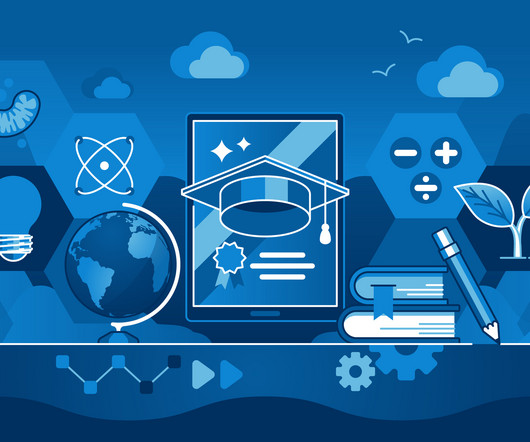
Faculty Focus
FEBRUARY 11, 2025
Banning AI use in college classrooms is a pointless and exhausting endeavor. Instead, we should learn alongside our students to become AI literate. It is imperative that all of us, students and faculty alike in higher ed institutions, learn AI basics and earn the right to use generative AI responsibly.

Faculty Focus
OCTOBER 11, 2022
It has been estimated that college students across the globe devote in excess of a billion hours per year to “disposable” assignments (Wiley, 2016). As soon as the material is assessed, it is no longer significant, and what has been learned quickly drops out of memory (Zull, 2002). What a waste! Implicit curriculum.

Faculty Focus
MAY 16, 2023
The Brazilian educator and philosopher, Paulo Freire, believed in a collaborative approach to education, where both the educator and the learner contribute to the learning process. Today, Freire’s teaching is not only relevant but necessary to adopt as we witness the transformation of teaching and learning.

HEPI
APRIL 30, 2024
Universities should be well placed to engage in research and education to develop strategies for mitigating these risks. At the University of Manchester, significant investments have been made to better understand AI modelling, deep learning, ethics and security.

Diverse: Issues in Higher Education
JULY 29, 2024
In April, Dr. Aaron Thompson, president of the Kentucky Council on Postsecondary Education (CPE), participated in the Attaining College Excellence and Equity Summit put together by the U.S. Department of Education and the Institute for Higher Education Policy. The data show that attainment gaps are narrowing.

Faculty Focus
APRIL 11, 2023
One of the most foundational books I’ve read as an online educator of nontraditional adult learners is Carol Dweck’s Mindset: The New Psychology of Success. Overall, my top three recommended practices include: self-regulating strategies, video-based learning, and formative assessments.
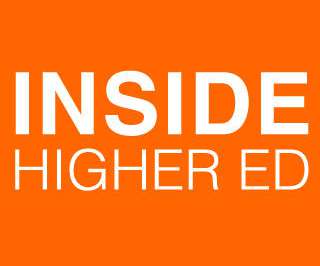
Inside Higher Ed
DECEMBER 7, 2022
Even though higher education has its own hazing rituals and rites of passage, it doesn’t impose tests of character. I raise these examples to prompt a bigger issue: Are there things that higher education should do but can’t or won’t? We can dismiss flawed graduates as a handful of bad apples.

Faculty Focus
JANUARY 23, 2024
According to The Glossary of Education Reform (2016), engagement refers to the degree of attention, curiosity, interest, optimism, and passion students show when they are learning or being taught. Engagement can extend to the level of motivation students learn during the process of learning.

Faculty Focus
MARCH 3, 2024
The pandemic in 2020 accelerated the adoption of learning technologies in education. Campus leaders had to rethink the digital learning resources available, and faculty had to rapidly adapt to changes in delivery methods while keeping students engaged. Research in healthcare (Kobayashi et al., 2018; Zhao et al.,

Faculty Focus
APRIL 11, 2023
One of the most foundational books I’ve read as an online educator of nontraditional adult learners is Carol Dweck’s Mindset: The New Psychology of Success. Overall, my top three recommended practices include: self-regulating strategies, video-based learning, and formative assessments.
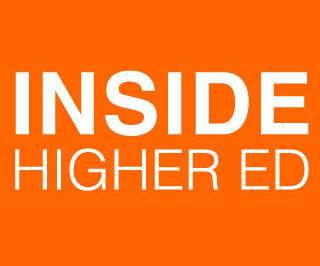
Inside Higher Ed
DECEMBER 6, 2022
That isn’t possible in higher education. Shared governance stands in the way, even though it is conceivable, in theory, to measure student persistence within a particular discipline and student performance in subsequent classes (performance measures that some for-profit colleges actually use).

WCET Frontiers
JANUARY 5, 2023
In 2023, WCET will look at Artificial Intelligence (AI) and provide support and resources to help you break through the rhetoric and understand both the promises and perils of AI in higher education. To begin, this introductory blog post will focus on an overview of large language model AIs and their potential impact on higher education.

Faculty Focus
MARCH 3, 2024
The pandemic in 2020 accelerated the adoption of learning technologies in education. Campus leaders had to rethink the digital learning resources available, and faculty had to rapidly adapt to changes in delivery methods while keeping students engaged. Research in healthcare (Kobayashi et al., 2018; Zhao et al.,
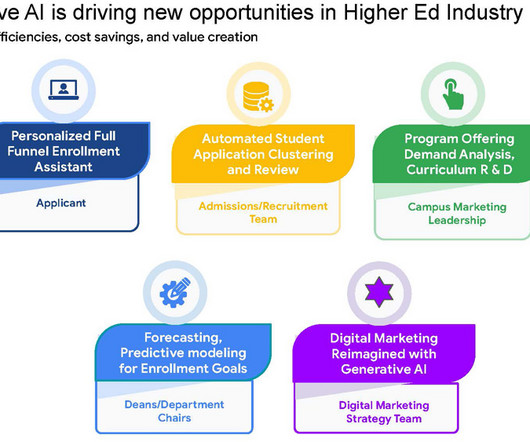
Helix Education
SEPTEMBER 28, 2023
The following reflects these conversations, and I seek to align them with my thoughts envisioning how Gen AI, machine learning, and deep learning can tackle these hurdles. The post Generative AI in Higher Education: A 360-Degree Approach appeared first on Ruffalo Noel Levitz. I’d highly appreciate that!

Inside Higher Ed
SEPTEMBER 30, 2022
Though the 28 laureates in attendance this year gave and listened to each other’s talks with optimistic titles such as “Computing for Social Good,” Inside Higher Ed took the opportunity to ask them questions about computer science’s challenges in higher education. “Do we have to choose?

Inside Higher Ed
MARCH 14, 2023
As a researcher in the areas of artificial intelligence and machine learning, I wanted to make sure the new MSCS degree program had a strong framework of courses in machine learning, deep learning, natural language processing and other core AI topics, along with course offerings in application and theory. Klivans: Yes.
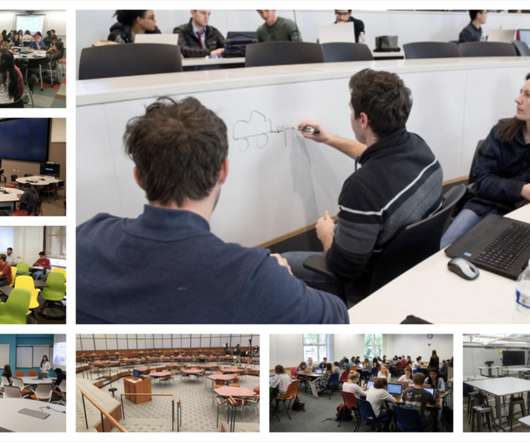
Inside Higher Ed
SEPTEMBER 16, 2022
These are positive developments from the perspective of groups such as the Association of American Universities and the American Association of Colleges and Universities, which promote high-impact practices that increase student engagement and deep learning. Yet the growth of active learning spaces remains incremental.
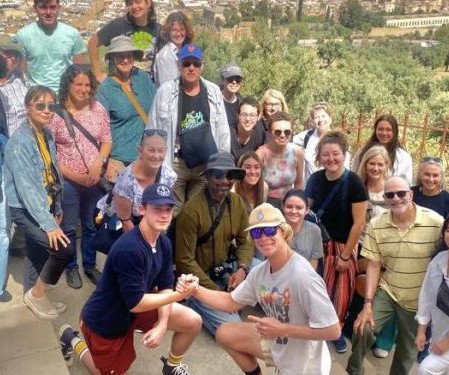
The PIE News
MAY 16, 2023
The ship is the floating campus of Semester at Sea of the Institute of Shipboard Education, where, each semester , over 500 students spend four months abroad in nearly a dozen countries. It’s one of the best educational things I have ever done in my life.” SAS] is a life-changing, transformational experience,” said Denning.

Faculty Focus
JANUARY 23, 2024
According to The Glossary of Education Reform (2016), engagement refers to the degree of attention, curiosity, interest, optimism, and passion students show when they are learning or being taught. Engagement can extend to the level of motivation students learn during the process of learning.

Faculty Focus
OCTOBER 6, 2022
In face-to-face courses, learning is compartmentalized into blocks that meet a prescribed number of times per week across the term or semester. It effectively facilitates sequenced and accretive design but regularly loses opportunities to maximize deep learning between class units.

Inside Higher Ed
JANUARY 4, 2023
Here’s assertion number one: The fundamental purpose of an education is to learn stuff, but our system of education doesn’t necessarily support that goal. For example, students taking a shortcut to a grade in order to avoid the longer journey through learning is not a new phenomenon.

EAB
JUNE 8, 2023
Our EAB research team spoke with dozens of higher education leaders—ranging from presidents, provosts, and CIOs–about the emergence of AI tools on campus. To help inform ongoing conversation, this article explores six innovative ways higher education can embrace AI with examples from across sectors.

Susquehanna President's Blog
DECEMBER 12, 2021
Good Questions Our oldest niece is college shopping. Here are a few of those question and some additional considerations for soon-to-be college students and their families. Adjuncts are a valuable resource for colleges and universities. Lower student-faculty ratios increase individualized learning opportunities.

EAB
DECEMBER 4, 2023
What Every Cabinet Leader Needs to Know about AI How will AI transform higher education? Student Affairs, Finance, Institutional Research, Schools and Colleges, etc.) This isn't just a question for the future—the changes have already begun. This lets people make productive use of them with little training. and external parties (ie.

Inside Higher Ed
JANUARY 10, 2023
Anyone who cares deeply about American higher education needs to come to grips with a series of hard and unpleasant truths: That this country’s system of postsecondary education relegates the students with the greatest needs to the most underresourced institutions.

Inside Higher Ed
JANUARY 2, 2023
Blog: Higher Ed Gamma A Gallup and Purdue poll of 30,000 college grads from 2014 found that students who had a rich, robust relationship with a faculty member were twice as likely as peer graduates to report high levels of well-being. In Relationship-Rich Education by Peter Felten and Leo M. ” Absolutely true.

University Business
MARCH 20, 2024
Higher ed leaders have been warned about the deep learning setbacks K12 students experienced during the pandemic, which trickled down all the way to the elementary level. Remote learning, catalyzed by quarantine mandates during the pandemic, is a key driver of K12 students’ current academic declines, The New York Times reports.

University Business
JANUARY 6, 2025
Artificial intelligence is transforming higher education, influencing recruitment, research and classroom experiences.But while we tend to talk about AI as if its a single, monolithic technology, thats of course not the case. The decision-making processes of these deep-learning systems are locked away in an impenetrable black box.

Higher Education Inquirer
OCTOBER 2, 2024
What happens to higher education if Trump wins November’s election? We’ve been exploring this question over the past year, including months of reading, analysis, reflection, and conversation about Project 2025 might mean for higher education. [Editor's Note: This article first appeared at BryanAlexander.org.]
Expert insights. Personalized for you.
We have resent the email to
Are you sure you want to cancel your subscriptions?


Let's personalize your content